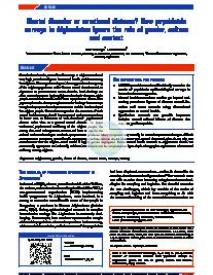Mental disorder or emotional distress? : How psychiatric surveys in Afghanistan ignore the role of gender, culture and context
Over the last decades, mental health surveys in Afghanistan found very high prevalence figures for mental health problems among the Afghans. These epidemiological data suggest that the majority of the Afghan population suffer from a mental disorder such as depression or post-traumatic stress disorder. Such findings are often met with surprise by the Afghans who doubt that most of the people around them would suffer from a psychiatric illness.
This paper explores the discrepancy between the findings from surveys using brief symptom-based questionnaires and the lived reality of the Afghan people. The authors argue that the outcomes of such mental health surveys should be interpreted with caution and can be better seen as indicators of ‘non-disordered’ psychosocial distress rather than as a general mental disorder. To better understand psychosocial wellbeing of the Afghan people, the survey data need to be put into context and have an eye for the cultural and social ecologies in which symptoms are produced.
Many symptoms may actually be normal responses to living in difficult circumstances. Moreover, mental health surveys may conflate cultural idioms of distress with mental illness and often do not take into consideration that the Afghan social world is highly gender segregated. Future mental health research in Afghanistan should use contextually appropriate and culturally validated instruments and be complemented by in-depth ethnographic explorations of emotional suffering among Afghans.
KEY IMPLICATIONS FOR PRACTICE
MHPSS practitioners should critically examine the results of psychiatric epidemiological surveys in humanitarian emergencies.
Mental health researchers need to go beyond estimating prevalence figures of discrete mental disorders and move towards using dimensional approaches to mental health.
Qualitative research can provide important insights around cultural idioms of distress that may be gender-specific.
In: Intervention: Journal of Mental Health and Psychosocial Support in Conflict Affected Areas, ISSN 1571-8883 | 16 | 3 | September-December | 207-214
http://doi.org/10.4103/INTV.INTV_60_18
http://www.interventionjournal.org/article.asp?issn=1571-8883;year=2018;volume=16;issue=3;spage=207;epage=214;aulast=Ventevogel;type=0


